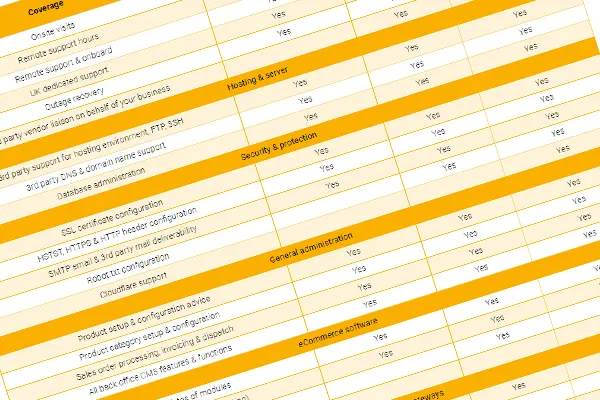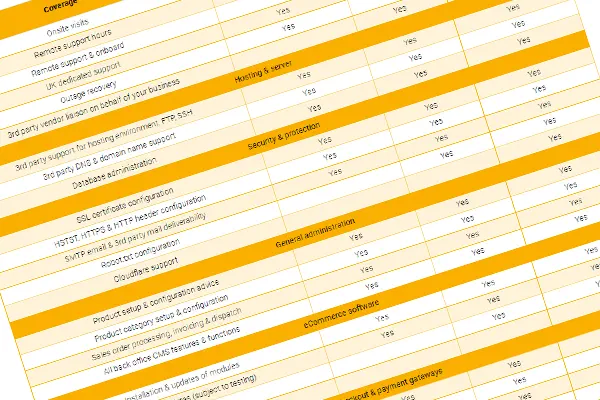If you’re in the personalisation industry, chances are that you’re storing and handling hundreds – perhaps thousands – of individual products. Are your systems managing to handle that many products plus their personalisation, or does your organisation need more help? That’s where effective product management plus the right back-office systems are essential.
Product management is the planning, forecasting, production and despatching of products. It should form a significant part of a personalisation company’s marketing plans and fit in with the strategic aims of the business.
Managing products can be an intricate and difficult task. While it can be an overlooked discipline, it’s vitally important to the success of any product-driven business. Understanding stock levels and how they impact on organisational efficiency is key to a successful personalisation business.
Stock can be managed manually, but this is time consuming and may not be based on accurate data if you’re working from legacy systems with scattered information. That’s why you may need to consider new processes and systems to effectively manage your product inventory.
Effective stock management offers a number of challenges. These include understanding what customers want and ensuring that you stay up to date with trends and fashions. This links into another challenge: attracting and retaining customers. Retaining customers is particularly important, as it costs far less to keep a customer than to find a new one, and therefore stock levels and product lines need to be monitored.
Technology can be another challenge when it comes to stock management. Whether it’s a website issue or a back-office issue, outdated technology can have a real impact on your organisation’s bottom line.
Pricing is an often-overlooked subsector of product management. The personalisation market is a highly competitive industry and can be very price sensitive. However, fully understanding overheads and stock levels means you can be both competitive and profitable.

You have a big commercial order come in. Perhaps it’s for dozens of uniforms, perhaps it’s for hundreds of personalised pens or mugs. Do you have enough stock at hand? Do you know? If you’re not sure, you don’t know if you can fulfil that order in time, or if you need to order additional stock.
Alternatively, how many embroidered fleeces did you sell last winter? Was it one hundred or one thousand? Again, if you don’t know, you can’t plan your stock levels. You might end up overstocking and be left with hundreds of fleeces taking up space and eating into your budget.
Data is key to successful product management, and if you’re using older, siloed systems, you may not have that information to hand. Not knowing your current stock levels, or understanding purchasing patterns, will have a detrimental effect on the bottom line.
As we all know, fashions and fads come and go. What’s stylish one year may well be outdated the following. A good product manager knows this. They stay on top of the latest trends and ensure that appropriate products are available. Understanding fashionable styles and managing stock levels appropriately is key to successful trading. This is particularly true when it comes to workwear.
Again, data is key. Getting rid of old stock that’s taking up space and costing money is vital. Product management again matters, combined with marketing. A good strategy based on business intelligence (BI) is necessary to deal with stock management.
There are three steps in the process of product management. This allows for success in a very competitive market.
As already mentioned, fashions change. A good product manager monitors the market closely and looks for the most popular items. These may be a novelty to the market, or may be older but reliable products that always sell well. Getting this balance right is important, and should form part of a wider marketing plan that supports the success of the business.
As already mentioned, whether it’s old products or new, stock monitoring is essential for profitability. This entails not only constant management of existing stock levels, but also sales, and customer feedback. This feedback is vital for understanding market forces that are driving current and future markets and help to predict sales in the near-to-medium future for better stock control.
Identifying poor performing products is just as important as identifying those that are selling well. Underperforming items take up space and profitability. They need to be managed well and sold at as high a price as possible given that they need to be disposed of efficiently and cost-effectively to a reluctant market.
Managing your product portfolio and concentrating on creating high quality products with the lowest stock levels feasibly possible for a cost-effective operation. Those managing products should also be ensuring that the quality of their personalised items is meeting their clients’ requirements. This not only means that you can sell at a higher price, but also that customers return, saving money on attracting new custom.
Without effective business information, product management is a guessing game. They might be educated guesses, but they’re still guesses. This effects not only the bottom line of the business but also can impact sales opportunities.
Imagine you have a salesperson visiting a client. That client wants to place a substantial order. Your salesperson doesn’t have access to the latest stock data, and nor do your office staff. Your salesperson may promise the order by a set date, only to find out that there is inadequate stock and it’s impossible to meet the client’s deadline. You have a disappointed client who’s likely to go elsewhere next time.

Demystify Digital has over a decade’s experience of working with personalisation companies providing end-to-end solutions for effective business intelligence and product management. Whether it’s a new eCommerce website you need, cloud-based SaaS software or a back-office system that simplifies your production and product management processes.
If you want to explore how you can improve product management and, therefore, profitability, you can get in touch with us for a FREE one-hour, no obligation consultation at [email protected] or call us on 01903 372 402. We look forward to being able to help.
Think or can help or need to talk? Book an online Teams meeting today or call 01903 372 402